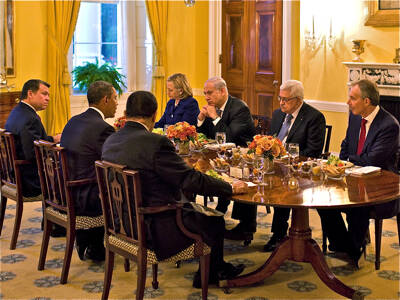Skeptics may consider it political window dressing, but another round of Middle East peace negotiations began with a Sept 1 White House meeting aimed at resurrecting the long stalled process. The opening event was hosted by President Obama and included Israeli Prime Minister Benjamin Netanyahu and Palestinian Authority President Mahmoud Abbas. Some reasons to be hopeful? For one, that the parties are talking directly together again at all said Emad Shahin, an Associate Professor of Religion, Conflict and Peacebuilding at Notre Dame’s Kroc Institute for International Peace Studies.
The renewed negotiations, he said, also clearly enjoy the strong support of a “determined” Obama administration and the endorsement of important regional players including Egypt, Jordan and Saudi Arabia. In fact on hand to lend moral support to the renewed effort during the opening talks were Egyptian President Hosni Mubarak, Jordan's King Abdullah II and Quartet envoy, former Prime Minister Tony Blair of Great Britain.
The skepticism of everyday Palestinians, however, may prove harder to overcome. Shahin said many Palestinians are critical of the current round, concerned that Abbas is “being dragged into the process” after apparently abandoning long-held preconditions for renewed talks, such as commitments to restrain further Israeli settlement of Palestinian land. And Palestinians in Gaza, particularly the leadership of Hamas, Islamic Jihad and other groups, are furious that talks are proceeding without their consultation.
Hamas terrorists have already launched several attacks intended to disrupt the negotiations, and four Israeli settlers in Hebron, including a pregnant woman, have been killed. Shahin said additional acts of terror intended to disrupt the peace talks from Hamas or other groups is not out of the question. “But if there is a clear agenda and we can see where we are heading and there is a strong political will to get it done, I don’t think these attacks can really sabotage the process,” Shahin said. What will be key is if tangible results become obvious quickly in the process so it is not perceived as just another Middle East photo op.
One key test emerges soon: Israel’s self-imposed moratorium on further development of communities of Israeli settlers on the occupied West Bank expires on September 26. If the freeze is lifted by the Netanyahu government, filled as it is with supporters of the settler movement, the process, said Shahin, is probably doomed—again. If the ban on new settlements on the West Bank is extended, it will be a strong indication of the current Israeli government's commitment to a real peace process this t ime. Prime Minister Netanyahu has already said that the moratorium will not continue after September 26, arguing that settlements are not an issue that pertain to these talks. President Abbas has warned, for his part, that the Palestinian Authority would drop out of the direct talks if the moratorium is lifted. Settlements in the West Bank and Israeli-annexed East Jerusalem are considered illegal by the international community.
At a White House press conference on September 10, President Obama said, “A major bone of contention during the course of this month is going to be the potential lapse of the settlement moratorium.... What I’ve said to Prime Minister Netanyahu is that given that so far the talks are moving forward in a constructive way, it makes sense to extend that moratorium.”
“The politics for Prime Minister Netanyahu are very difficult; members of his coalition say we don’t want to continue [the moratorium].” The president said he has urged President Abbas “to show the Israeli public that he is serious and [negotiations can be] constructive.”
The two Middle East leaders have to learn, President Obama said, how to help each other succeed, not fail, to “see the world through the other person’s eyes.” Ultimately what’s going to resolve this conflict, the president said, is for Israelis and Palestinians to decide “what is going to be Israel and what is going to be the state of Palestine.”
Stephen Colecchi is the director of the U.S. Conference of Catholic Bishops’ Office of International Justice and Peace. After so many thwarted efforts in the past, he said he understands why people may be skeptical about the likely outcome of the current round of negotiations. But “as people of faith,” he said, “we have no choice but to be hopeful. If we can’t hope for a better future, if we can’t imagine a better future, we can’t get there.” Colecchi said it was up to the members of the faith community in fact to “mobilize” hope in support of the renewed peace process. “The greatest enemy to the current negotiations is skepticism to a fault.”
Acknowledging that the hawkish Netanyahu makes an unpromising protagonist for peace, Colecchi said, “God uses the unlikeliest instruments sometimes to do God’s will.”
That’s an assessment Shahin would not challenge. He argued that only a strong Israeli leader like Netanyahu, trusted to assure national and personal security by Israel’s right wing, could deliver peace to the region. Shahin recalls that it took the hard-right Likud party and Menechem Begin’s leadership to reach an unprecedented peace agreement with Egypt in 1979. “You need a strong Israeli government to conclude the peace,” he said.
The second round of talks ha ve been scheduled for September 14. They will include U.S. Special Envoy for Middle East Peace George Mitchell and Secretary of State Hillary Clinton who will join Israeli and Palestinian leaders at the Egyptian Red Sea resort of Sharm el-Sheikh.








